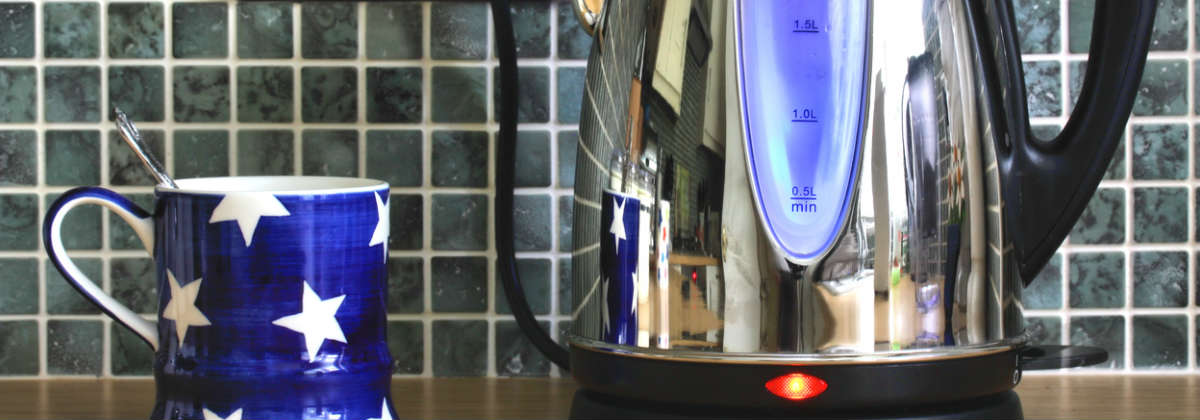KEY POINTS
- The amount of electricity your kettle uses will depend on its wattage and size.
- An electric kettle tends to cost between five and six cents to boil.
- Boiling your kettle twice per day will add around $30 – $40 to your annual electricity costs.
You flick on the kettle, walk away, and return to a jug of boiling water. But how much did that just cost you? Canstar Blue has crunched the numbers to find out how much boiling your kettle could be adding to your electricity bill. We compare annual costs below, based on usage for one, two, three, four, five and 10 times boiled per day.
On this page:
How many watts does a kettle use to boil?
The wattage of a kettle refers to how much energy it will consume within one hour. So a 2200 watt (2200W) kettle, for example, will consume 2200 watts in one hour.
Kettle wattage will vary between 2000W and 2400W, with most commercial kettles ranging in size from 1.5L to 1.8L. As you might expect, larger kettles= consume more electricity than smaller kettles.
Kettle-boiling costs explained
So, just how much will it cost on your electricity bill to boil a kettle once? In the table below, Canstar Blue has calculated the cost of boiling a kettle.
Kettle boiling costs based on wattage and size
| 1.5L | 1.6L | 1.7L | 1.8L | |
|---|---|---|---|---|
| 2400W | 5.3c | 5.7c | 6.0c | 6.4c |
Source: www.canstarblue.com.au – 31/03/2025. Based on the time needed for a full kettle to boil and energy usage for the boiling duration. Time to boil calculated based on: 23°C starting water temp, 100°C ending water temp, and 80% efficiency. Electricity usage cost estimates based on the average electricity usage rate of 31.6c/kWh for single-rate, non-solar only plans on Canstar’s database, available for an annual usage of 4,373kWh.
What you might begin to notice is that it’s not the power consumption level that increases the cost of boiling a kettle but rather the size. That’s because a more powerful kettle will boil water faster, so while it consumes more electricity at any one moment, this is negated by the kettle’s reduced operating time. This could be something to keep in mind next time you are in the market for a new kettle, especially if you are looking to reduce some of your household running costs.
Worried you’re paying too much for power? See if you are missing out on a cheaper deal below
Here are some of the cheapest published deals from the retailers on our database that include a link to the retailer’s website for further details. These are products from referral partners†. These costs are based on the Ausgrid network in Sydney but prices may vary depending on your circumstances. This comparison assumes general energy usage of 3900kWh/year for a residential customer on a single rate tariff. Please use our comparison tool for a specific comparison in your area. Our database may not cover all deals in your area. As always, check all details of any plan directly with the retailer before making a purchase decision.
Here are some of the cheapest published deals from the retailers on our database that include a link to the retailer’s website for further details. These are products from referral partners†. These costs are based on the Citipower network in Melbourne but prices may vary depending on your circumstances. This comparison assumes general energy usage of 4000kWh/year for a residential customer on a single rate tariff. Please use our comparison tool for a specific comparison in your area. Our database may not cover all deals in your area. As always, check all details of any plan directly with the retailer before making a purchase decision.
Here are some of the cheapest published deals from the retailers on our database that include a link to the retailer’s website for further details. These are products from referral partners†. These costs are based on the Energex network in Brisbane but prices may vary depending on your circumstances. This comparison assumes general energy usage of 4600kWh/year for a residential customer on a single rate tariff. Please use our comparison tool for a specific comparison in your area. Our database may not cover all deals in your area. As always, check all details of any plan directly with the retailer before making a purchase decision.
Here are some of the cheapest published deals from the retailers on our database that include a link to the retailer’s website for further details. These are products from referral partners†. These costs are based on the SA Power network in Adelaide but prices may vary depending on your circumstances. This comparison assumes general energy usage of 4000kWh/year for a residential customer on a single rate tariff. Please use our comparison tool for a specific comparison in your area. Our database may not cover all deals in your area. As always, check all details of any plan directly with the retailer before making a purchase decision.
How much is boiling my kettle costing me each year?
While boiling an electric kettle typically only costs between 5 and 6 cents in one sitting, the yearly costs could begin stocking up pretty quickly if you are using the appliance multiple times a day.
According to Canstar Blue’s calculations, making your morning or afternoon cuppa could be costing you as little as $19.35 or as much as $233.60 each year, depending on the number of times you top up your cup in a day and the size of your kettle.
In the table below, we’ve looked a little closer at these potential costs, using the same assumptions as the table above. These have broken down by boiling the kettle one, two, three, four, five or 10 times a day in a year.
Annual cost of boiling the kettle
| 1/day | 2/day | 3/day | 4/day | 5/day | 10/day | |
|---|---|---|---|---|---|---|
| 1.5L | $19.35 | $38.69 | $58.04 | $77.38 | $96.73 | $193.45 |
| 1.6L | $20.81 | $41.61 | $62.42 | $83.22 | $104.03 | $208.05 |
| 1.7L | $21.90 | $43.80 | $65.70 | $87.60 | $109.50 | $219.00 |
| 1.8L | $23.36 | $46.72 | $70.08 | $93.44 | $116.80 | $233.60 |
Source: www.canstarblue.com.au – 31/03/2025. Electricity usage cost estimates based on average electricity usage rate of 31.6c/kWh for single-rate, non-solar only plans on Canstar’s database, available for an annual usage of 4,373kWh for a 2400W kettle.
You might also like:
Can I get an energy efficient kettle?
Some kettles are more energy-efficient than others, with some being marketed specifically for their energy-saving features. Kettles with insulation are designed to conserve heat after boiling, keeping the water hot for longer and avoiding the need to re-boil sooner.
Popular brands including Breville, Russell Hobbs and Bosch all sell ‘eco’ or energy-saving kettles that are packed with extra features such as rapid boil, temperature control and filters.
How can I reduce the cost of my kettle?
Some quick ways to potentially reduce the cost of boiling your kettle include:
- Checking the kettle wattage when comparing kettles.
- Buying the right-sized kettle for your household and usage.
- Only boiling the amount of water you need.
- Using your boiled hot water immediately to avoid needing to re-boil.
To find an energy efficient kettle, you need to look at the wattage. As mentioned earlier, the lower the kettle wattage, the less energy it will consume.
As displayed in the tables above, the size of a kettle also plays a significant role in the final operating costs. So, if you’re pulling all the stops to minimise your energy bill, it may help to only fill the kettle with as much water as you need at that moment, rather than filling it to the brim. The less it has to boil, the less time it is likely to take, and therefore the less it might cost you in the long haul.
No matter the boiling times however, if you’re still on an energy plan that’s on the more expensive side, then you won’t be doing yourself any favours when it comes to usage costs for your appliances. If you can’t remember the last time you switched providers then it might be time to compare offers in your area to ensure you’re still getting the best deal. Our free electricity comparison tool allows you to compare offers from a range of providers in your area.
Original author: Kelseigh Wrigley




Share this article